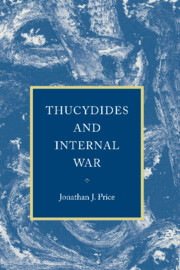2 - The transvaluation of words
Published online by Cambridge University Press: 22 September 2009
Summary
In the last chapter we identified and examined three species of linguistic change attendant on stasis which an outside observer can witness. The first is explicitly and coherently stated in the model, namely that corruption in a society's values and in the institutions which represent those values is reflected in the transvaluation of words. The second derives from an implied problem solved by Thucydides' original approach to stasis: the members of each side in a stasis, even if related by blood, must reconceive and redefine their opponents as alien, “the enemy” and all that that implies, and the stasiotai of each side must also redefine the entity being fought over – their κοινωνία – in such a way as both to de-legitimize their opponents and to confirm their own legitimacy. The contending factions in a stasis rarely admit they are in a stasis. The third phenomenon follows from the first two: there is a general breakdown in communication. Two or more contending groups, who in the past had shared language, religious beliefs and institutions, moral systems, and social and political institutions, not only stop sharing all those elements of mutual identity and purpose but also lose the ability to communicate effectively once those bases for mutuality disappear. Words, aside from failing as a vehicle for mutual understanding, become another violent and especially treacherous weapon in the arsenals of the contending factions.
- Type
- Chapter
- Information
- Thucydides and Internal War , pp. 81 - 126Publisher: Cambridge University PressPrint publication year: 2001



